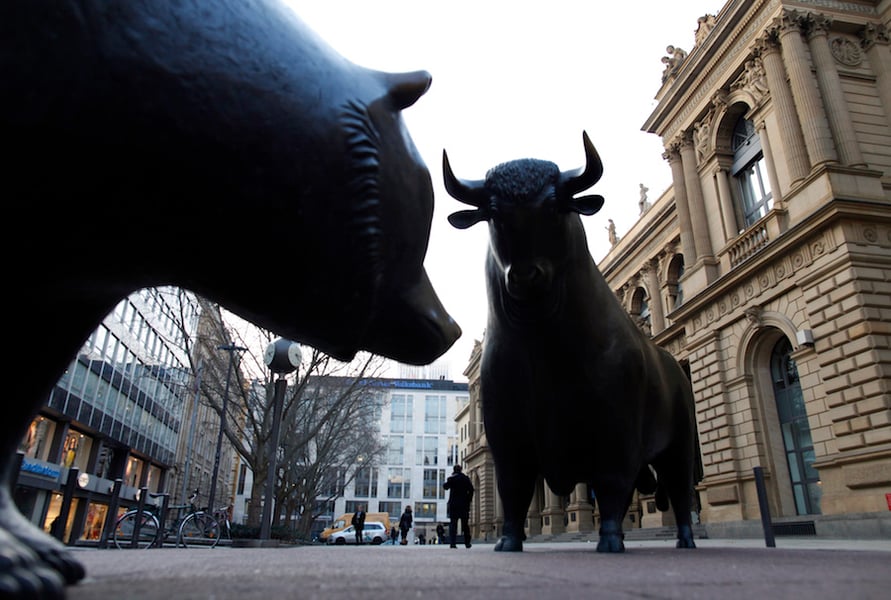U.S. stocks surged back to pare the biggest one-day selloff in five months, with the Dow Jones Industrial Average cutting a loss of 550 points by two-thirds as investors speculated the rout that's wiped more than $15 trillion from global equities has gone too far too fast.
A plunge that took oil past $27 a barrel sparked earlier selling that brought global equities near a bear market and fueled haven demand.
The Nasdaq Composite Index and the Standard & Poor's 500 Index shaved losses of more than 3.5% as chip shares and those with the most short interest rallied. The afternoon surge wasn't enough to push either into the green at the close, and both ended at the lowest levels in at least 15 months.
http://www.investmentnews.com/wp-content/uploads/assets/graphics src="/wp-content/uploads2016/01/CI103440120.PNG"
OIL, FED
“Everybody has been perched on the edge of their chair waiting to see a capitulation day, in which you get a really steep flush in equities,” said Mark Luschini, chief investment strategist in Philadelphia at Janney, which oversees about $68 billion. “That's usually indicative of a point where a market may stage a reversal, and we had that today.”
MSCI Inc.'s gauge of global equities fell to 19% below its May record, clawing back from the precipice of a bear market. Emerging shares remained 3% lower, while Russia's ruble and Mexico's peso fell to records. Yields on 10-year Treasuries dropped below 2% and the yen jumped to a one-year high.
“There are a lot of things behind” the selloff, said Stephen Schwarzman, the chief executive officer of
Blackstone Group LP, in an interview Wednesday with Bloomberg Television's Erik Schatzker from Davos, Switzerland. “You have economic things such as the slowing of the U.S. economy which has been pretty gradual. You've got energy going down so quickly that you can almost get windburn. You've got China as an issue which is is probably overdone. So when you put those factors together you have an unattractive brew along with the concern the Federal Reserve will raise rates and slow the economy further.”
STOCKS
Equities markets buffeted by everything from China to oil and rising interest rates are off to the worst start to a year on record at the same time the Federal Reserve and other central banks have signaled a higher threshold before they'll provide relief. The rout in the oil patch is rippling through markets amid growing signs that credit quality is worsening. U.S. bonds now predict the slowest inflation since May 2009 as investors pile into haven assets.
The MSCI All-Country World Index fell 2% at 4 p.m. in New York, bringing its drop from a May record to 19.3%. The index tumbled more than 3% and for most of the session was poised to close in a bear market.
The S&P 500 slid 1.2%, paring a drop of 3.7% that was the steepest since the height of the August selloff. The index closed at 1,859.33, the lowest level since April 2014, and is now down 9% this year.
Energy shares fell 2.9%, reversing a slide that was deeper than 5%. Indexes of chipmakers and consumer durables producers climbed as investors bought shares of some of the most shorted companies.
TECHNICAL SIGNAL
The S&P 500's plunge triggered a technical signal that indicates it's oversold. The gauge's relative strength index, which measures whether gains or losses have been too fast to sustain, dipped below 30, a threshold that indicates a rebound may materialize. The RSI last fell below 30 on Jan. 13. The prior time it was that low was on Aug. 25, when the S&P 500 hit a bottom and rallied 6.5% over the next three days.
“We were oversold and we didn't keep falling off the table,” said Walter “Bucky” Hellwig, who helps manage $17 billion as a senior vice president at BB&T Wealth Management in Birmingham, Alabama. “The last-hour strength is positive and I think it's due to the fact that investors are saying, 'this thing is oversold, I'm going to put some money to work.”'
The equities selloff had lowered valuation metrics, leaving the S&P 500 trading at 14.9 times the forecast earnings of its members, in line with the index's average of the past five years. It's still more expensive than developed markets in Europe, where the Stoxx 600 Index trades for 13.8 times estimated earnings.







